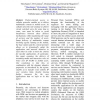Free Online Productivity Tools
i2Speak
i2Symbol
i2OCR
iTex2Img
iWeb2Print
iWeb2Shot
i2Type
iPdf2Split
iPdf2Merge
i2Bopomofo
i2Arabic
i2Style
i2Image
i2PDF
iLatex2Rtf
Sci2ools
126
click to vote
NETWORKING
2000
2000
Smart Delivery of Multimedia Content for Wireless Applications
Packet-oriented access to cellular networks enables us to deliver multimedia content to mobile users. As cellular networks will continue to deliver circuit switched voice for some time to come, care must be taken to avoid interference between these delivery mechanisms, while maximizing the range of services and the number of users. Smart delivery of multimedia content involving agents running in the mobile, the base station and the content provider allows us to dynamically adapt the application and network behavior to each other in order to meet the criteria for specific applications. In particular, this paper examines the delivery of streaming media and interactive voice as Voice over IP (VoIP) to mobile users. Our conclusion is that this, in combination with the dynamic adaptive properties as introduced by the agents, enables us to transfer voice entirely IP over wireless links, thereby freeing further resources for the new applications that we refer to in this paper.
Cellular Networks | Circuit Switched Voice | Multimedia Content | NETWORKING 2000 | NETWORKING 2007 |
Related Content
| Added | 01 Nov 2010 |
| Updated | 01 Nov 2010 |
| Type | Conference |
| Year | 2000 |
| Where | NETWORKING |
| Authors | Theo Kanter, Per Lindtorp, Christian Olrog, Gerald Q. Maguire Jr. |
Comments (0)

